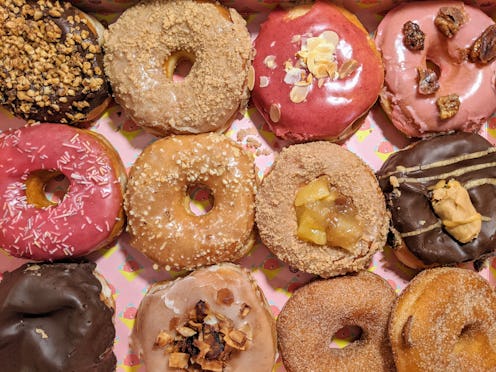Life
7 Tips To Cut Back On Sugar

When most people think about an aspect of their diet they'd like to change, many people think about sugar. Even if you don't have a huge sweet tooth, sugar shows up in a variety of unsuspecting foods, so it's important to know the ways you can cut down on sugar. You might think that tossing all the desserts in your home is enough, but the sweet stuff has a way of sneaking into everything from tomato sauce to salad dressing.
Despite it's delicious taste, sugar can have numerous negative health effects, including high blood pressure, increased risk of heart disease, and more. Recently, the Dietary Guidelines for Americans recommended limiting sugar intake to less than 10 percent of your total calorie intake, making it even more important for you to be aware of the sources of sugar in your diet.
"Unfortunately, sugar has become a part of the American way of life," says Erin Palinski-Wade, RD, CDE, LDN over email. "The problem is, once we start eating sugar, it can be hard to stop. For many Americans, sugar has become the solution to a stressful day or it’s something we crave for an energy boost in the afternoon."
Indeed, research has found that sugar has an addictive effect similar to that of cocaine, which can make cutting out the additive quite a challenge. If you're looking for a way to cut back on your sugar intake, consider these seven tips to help you stop eating so much sugar.
1. Incorporate More Protein and Healthy Fat
"This helps to regulate blood sugar levels, which slows down the release of blood sugar in your body to prevent those spikes and dips that make people ravenous," says Palinski-Wade. "Fats help to keep us feeling fuller for longer and decreases overall desire for sugar."
2. Drink More Water
Ditch sweetened beverages like soda or fruit juice with a glass of water. "We often mistake dehydration for hunger," says Palinski-Wade. "The next time you feel a sugar craving coming on, have a full glass of water or a cup of tea. If you’re still hungry, then by all means, have a snack. However, often times you’ll realize you were really just thirsty and your craving will have passed."
3. Add Flavor
If you're one to sweeten your coffee daily and sprinkle sugar over your fruit salad, you may want to consider other sources of flavor that can spruce up your meals. "Jazz fruit up with almond butter, add vanilla extract and cinnamon to your oatmeal, and flavor yogurt with cocoa powder for a sweet dessert," suggests Palinski-Wade.
4. Decrease Sugar In Recipes
No one likes a bitter cookie, but that doesn't mean you have to use that full cup of sugar. "Most people don’t notice a difference in taste when the sugar in a recipe is decreased by a third," says Tory Tedrow, RD, CNSC for SugarChecked, a mobile application that alerts users of hidden sugar. You can also choose to use natural sweeteners such as applesauce or honey.
5. Choose Unsweetened Products
In general, avoiding processed foods can help you eliminate sugar, but in other cases, always look for the unsweetened variety. "Products like applesauce or almond milk have unsweetened versions available," says Tedrow. "If buying canned or packaged fruits, look for ones canned in water or juice vs. sugary syrups."
6. Check Labels
Always check nutrition labels, since some savory foods may contain sugar for extra flavor, and sugar can disguise itself with many names. "Any ingredient ending in '-ose' is a sugar," says Tedrow. "If a food has many sugary ingredients, especially near the beginning of the ingredient list, it may be an item you want to limit consumption of."
7. Focus On The Right Kind
If you really need to satisfy that sweet tooth, opt for a natural sugar such as fruits or dates. "Fresh fruit naturally contains sugar, but is less concentrated in fructose, the type of sugar that is linked to a rise in LDL — the bad type of cholesterol," says Palinski-Wade.
A small amount of sugar can be part of a balanced diet, but overall, intake needs to be reduced to reach optimal health and wellbeing.
Images: Getty Images (8)